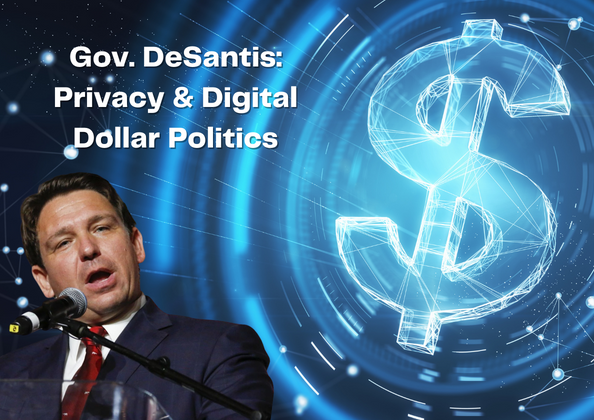Governor Ron DeSantis of Florida has proposed legislation to prevent the federal government from deploying a central bank digital currency (CBDC) in his state. He claims that CBDCs can enable surveillance by the federal government, threatening individual privacy and economic freedom. His draft would prohibit acceptance of an American CBDC under Florida’s Uniform Commercial Code and enact other limits against foreign countries’ CBDCs. He has also called upon “likeminded states to join Florida in adopting similar prohibitions … to fight back against this [CBDC] concept nationwide.” However, his move is unlikely to succeed as it reflects an unfortunate uptick in politicization.
SJ Schnapper-Casteras is a nonresident senior fellow at the Atlantic Council’s GeoEconomics Center and a practicing attorney. He is concerned about the potential for a consumer-facing Central Bank Digital Currency (CBDC) to amass and store large volumes of personal information about individuals’ daily purchases and movements. The American Civil Liberties Union has highlighted the importance of maintaining cash-like privacy if the executive branch and Congress move forward with a digital dollar. Schnapper-Casteras believes that the technical design and legal regulation of a CBDC should be carefully considered to ensure that individuals’ privacy is protected.
The Biden administration has expressed concern over the potential for Central Bank Digital Currencies (CBDCs) to be used for pervasive surveillance and control of citizens. To address this, the Federal Reserve Board and other agencies should take privacy seriously by consulting with nonprofit groups and reassuring the public that they have no interest in collecting vast amounts of consumer data. This would help to ensure that CBDCs are not used as a tool for oppressive regimes to monitor their citizens. By taking these steps, the Biden administration can ensure that CBDCs are used responsibly and for the benefit of all.
Florida Governor Ron DeSantis has proposed a bill that would prevent the Federal Reserve from issuing a Central Bank Digital Currency (CBDC). This bill is emblematic of the broader politics around the Federal Reserve, with other members of the Republican Party recently criticizing the Fed’s decisions on interest rates and proposing to eliminate its role in overseeing banks. The bill politicizes an issue that need not be so political, as Fed Chair Jerome Powell has greenlighted research around CBDCs but stressed he would need congressional authorization and public support before any CBDC plan could move forward.
Central Bank Digital Currencies (CBDCs) are being explored by 114 countries, representing over 95% of global GDP, including 18 Group of 20 (G-20) countries. The Biden administration is looking into the possibility of introducing a consumer-facing CBDC, though it is uncertain whether the US government will actually adopt one. It would be curious to see CBDCs become a hot-button issue for a national presidential campaign, as it is a relatively niche issue that has mostly been taken up by policy wonks. The technology for CBDCs has not been fully developed, and it remains to be seen whether the US will join the growing list of countries exploring the potential of this digital currency.”
Florida Governor Ron DeSantis recently proposed legislation to create a digital dollar, a form of cryptocurrency, as legal tender in the state. However, the U.S. Constitution gives Congress the power to regulate currency, and other federal laws make clear that federal law generally preempts state laws on banking. This proposal has sparked a national conversation about the privacy issues associated with a digital dollar, and Democrats and Republicans alike should take this opportunity to delve deeper into these issues. Ultimately, the outcome of DeSantis’ proposal could have a major impact on the daily lives of millions of Americans.













